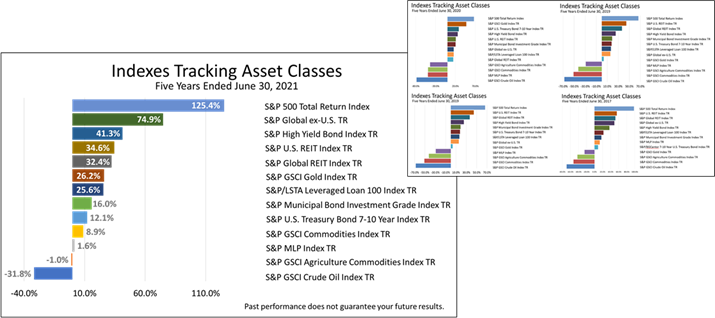As S&P 500 Closes At All-Time High Again, It’s A Great Time For A Crisis Plan
Published Wednesday, August 4, 2021 at: 4:12 PM EDT
For the five years through June 30, U.S. stocks were the No. 1 performing investment of major securities indexes! The S&P 500 index more than doubled in value, despite the pandemic! Remarkably, U.S. stocks were No. 1, not only for this five-year period through June 30, 2021, but for the past FIVE five-year periods ended June 30! And today the S&P 500 closed at a record high!
This is precisely the right time to ask yourself: What could go wrong?
The stock market has been treating American investors to outsized gains year after year, and the party could continue -- the good times could roll for another five years or get even better! As professionals, however, we believe it’s wise to plan for a stock market slump, to plan what you would do if things go wrong with your business, your job, or God-forbid, your health.

With the stock market and housing values sharply higher than a year ago, your net worth may be higher than ever, making this precisely the right moment to write a crisis plan. Your worst nightmare may be running out of money when you’re older, or who will care for a child with special needs after you’re gone. Or perhaps you’ve been prone to selling stocks after market plunges?

Everyone has their own personal reactions to life’s risks, and your financial nightmare is personal to you because it’s based on your experiences and personality characteristics. Even if your financial future is looking bright at this moment, writing your crisis plan now, rather than in the throes of a crisis, can help ensure you will continue to sleep soundly even if your worst financial nightmare were to come true.
Nothing contained herein is to be considered a solicitation, research material, an investment recommendation, or advice of any kind, and it is subject to change without notice. Any investments or strategies referenced herein do not take into account the investment objectives, financial situation or particular needs of any specific person. Product suitability must be independently determined for each individual investor. Tax advice always depends on your particular personal situation and preferences. You should consult the appropriate financial professional regarding your specific circumstances. The material represents an assessment of financial, economic and tax law at a specific point in time and is not intended to be a forecast of future events or a guarantee of future results. Forward-looking statements are subject to certain risks and uncertainties. Actual results, performance, or achievements may differ materially from those expressed or implied. Information is based on data gathered from what we believe are reliable sources. It is not guaranteed as to accuracy, does not purport to be complete, and is not intended to be used as a primary basis for investment decisions. This article was written by a professional financial journalist for Advisor Products and is not intended as legal or investment advice.
This article was written by a professional financial journalist for Preferred NY Financial Group,LLC and is not intended as legal or investment advice.
An individual retirement account (IRA) allows individuals to direct pretax incom, up to specific annual limits, toward retirements that can grow tax-deferred (no capital gains or dividend income is taxed). Individual taxpayers are allowed to contribute 100% of compensation up to a specified maximum dollar amount to their Tranditional IRA. Contributions to the Tranditional IRA may be tax-deductible depending on the taxpayer's income, tax-filling status and other factors. Taxed must be paid upon withdrawal of any deducted contributions plus earnings and on the earnings from your non-deducted contributions. Prior to age 59%, distributions may be taken for certain reasons without incurring a 10 percent penalty on earnings. None of the information in this document should be considered tax or legal advice. Please consult with your legal or tax advisor for more information concerning your individual situation.
Contributions to a Roth IRA are not tax deductible and these is no mandatory distribution age. All earnings and principal are tax free if rules and regulations are followed. Eligibility for a Roth account depends on income. Principal contributions can be withdrawn any time without penalty (subject to some minimal conditions).
©2021 Advisor Products Inc. All Rights Reserved.

